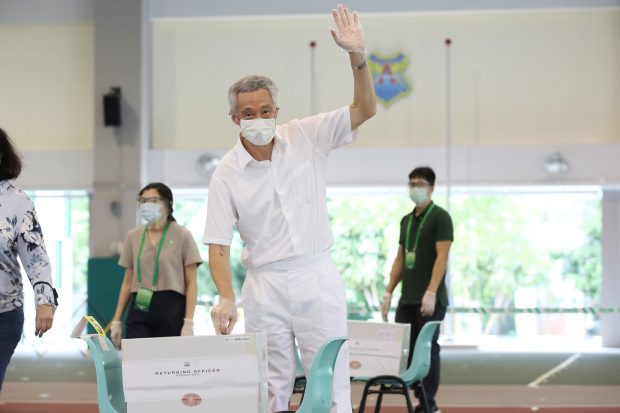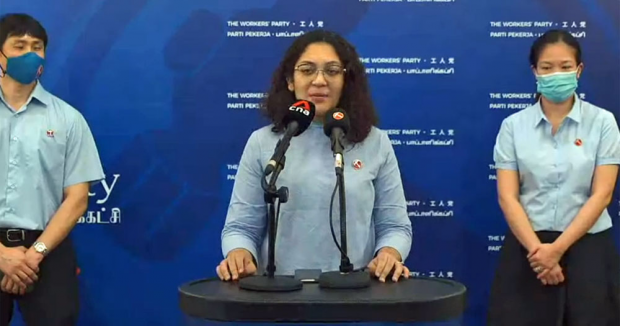Leeway to Opposition but Singaporeans play it safe in polls

PM Lee casting his ballot in Singapore’s general election (Twitter)
By Ivan Lim
Former AJA President, Contributor to AsiaN
SINGAPORE: Descendants of migrants from China, India and the Malay Archipelago, Singaporeans are said to have a keen sense of survival. This natural instinct could be seen in the way they voted on July 10 in the General Election held amidst the crisis of a generation blown in by a fearsome pandemic.
In a clear display of playing it safe, they returned the governing People’s Action Party (PAP) to power with a super-majority of 83 of the 93 seats at stake, secure in the belief that their life and livelihood would continue to be in experienced hands in the face of the Covide-19 threats.
At the same time, the younger generation played it brave by putting into Parliament a slate of 10 candidates from the main Opposition Workers’ Party (WP) despite retired Prime Minister Goh Chok Tong’s two survival calls: One, don’t rock the boat; two, ‘’pick a crew with the skills to row.” He was reinforcing PM Lee’s appeal to voters to give the party a strong mandate to steer the ship of state out of the Covid hurricane battering the economy.
The Opposition parties’ call for checks and balance in Parliament resonated with the “millennials”, but the majority saw it prudent to stay with the crew with decades of experience to steer the ‘‘Singapore sampan’’ in treacherous waters.
However, a yearning for change was unmistakable, as evidenced by the voting in of the WP team of young and well-educated contestants in the Sengkang group constituency – a public housing estate with many young families – despite the ruling party’s slate of a strong team led by the Minister without Portfolio- cum- secretary general of the National Trades Union Congress. It included even a Senior Minister of State and a Senior Parliamentary Secretary. Yet the PAP suffered a harsh blow.
In the same way, the WP retained the Aljunied GRC and the Hougang single-member constituency, garnering in both a higher vote margin than in the 2015 polls.
And in their new-found faith in the role of alternative views in Parliament, the pro-change, young voters gave passionate support to the Progress Singapore Party (PSP), led by former PAP stalwart Dr Tan Cheng Bock, and backed by PM Lee ’s brother Hsien Yang, both of whom had fallen out over their father Lee Kuan Yew’s legacy.
The PSP, campaigning hard on holding the government on accountability and its handling of the pandemic and the $93 billion relief budget, came close to beating the PAP team in the West Coast GRC. The PAP had thrown two ministers to hold the ground but its share of victory votes fell sharply to 51.9per cent from 78.57 per cent in 2015 against another party.
The WP success in snatching the Sengkang GRC and in consolidating its position in the Aljunied and Hougang wards it had clinched in 2015, plus the remarkable showing by the PSP and the Singapore Democratic Party (SDP)’s resolute fight, pared the PAP’s total vote share to 61.24 per cent against 69.9 per cent in the 2015 polls. Not amounting to a super-wave, the combined opposition inroads into the PAP traditional turfs has, nevertheless, set off a momentum for change.
While the PAP secured a clear mandate from the 2.65 million electorate, PM Lee told a press conference that the percentage of the popular vote was not as high as he had hoped for.
He acknowledged that the results showed “a clear desire for a diversity of voices’’ in Parliament. “Singaporeans want the PAP to form the government, but they, especially the younger voters, also want to see more Opposition presence in Parliament,” he said.
The key setback for the PAP is the “major loss” of the Sengkang GRC, and with it, the exit of labour chief and Minister without Portfolio Ng Chee Meng. This has left a gap in party’s leadership renewal plan. The Prime Minister said Mr Ng would continue to serve the party and nation in different ways.
An outcome of the GE, considered by analysts as positive for the city-state of 5.65 million people, is the pressure on the PAP to accept the role of the Opposition in Parliament. Until now, the PAP has been antagonistic towards Opposition parties. PM Lee had in 2006 regarded the presence of Opposition in Parliament negatively.
He had said: “What is the Opposition’s job? It is not to help the PAP do a better job! Their job is to make life miserable for me so that I screw up and they can come in and sit where I am here and take charge… suppose you had a Parliament with 10, 15, 20 opposition members…Then instead of spending my time thinking what is the right policy for Singapore, I am going to spend all my time thinking what is the right way to fix them…”
Interestingly, with the latest election, Parliament would have 10 WP lawmakers plus two non-constituency Members of Parliament, who are likely to come from the PSP whose team contested the West GRC had scored 48.3 per cent votes against the winning PAP team.
Now, bowing to the younger Singaporeans’ growing demand for more voices in Parliament, PM Lee has apparently changed his view of the Opposition’s role. In a call to congratulate WP chief Pritam Singh, and his party’s gains in the poll, Mr Lee also offered him the official designation of Leader of the Opposition.
Mr Singh was said to have thanked him. In a Facebook post yesterday (July 11), he said: “I look forward to serving as the Leader of the Opposition and will carry out my duties to the best of my abilities. I will endeavour to ensure that the Workers’ Party under my leadership will remain loyal to Singapore and all Singaporeans.”
Previously, the former WP chief Low Thia Kiang was given the title of unofficial Leader of the Opposition, which he declined.
Mr Low had once described the WP’s role in Parliament as a co-driver of a bus driven by the PAP.
“A co-driver is there to slap the driver when he drives off course or when he falls asleep or drives dangerously,” he said.
Between the two extremes, the WP and the PAP may now work their way towards a new form of engagement and discourse in Parliament.

MP-elect Raeesah Khan, 26, set to be youngest MP in modern Singapore (Twitter)
During the hustings, the contenders had sought to score points in sharp or even acrimonious exchanges in political debates on TV and on the Internet.
Away from the banned open-air rallies, the protagonists were able to come face-to-face in articulating their parties’ agenda and appeal directly to voters. This was a good outcome of the cyber-election, with any confrontation played out in front of home audience.
For instance, a dramatic moment came in the first political debate when a fierce tussle over the 10-million population issue saw Foreign Minister Vivian Balakrishnan chiding SDP chief Dr Chee Soon Juan for spouting what he dubbed a falsehood and calling his rebuttal a cheap shot.
The PAP followed it up with a statement to portray Dr Chee as the same politician who had not changed his ways. Netizens and media columnists cried foul over this personal attack.
At the tail-end of the electioneering, WP candidate Resaeeh Khan was reported by a complainant to the police for her Facebook postings carrying an allegation that the authorities were indulging in discrimination against minorities.
This prompted the PSP veteran Dr Tan Cheng Bock, to call out that the campaigning was veering into gutter politicking. And as the PAP began to invoke a fake news law (Protection from Online Falsehoods and Manipulation Act (Pofma) against opposition statements on the 10-million population and government taskforce’s missteps in tackling the Covid-19 pandemic, SDP chairman Dr Paul Tambyah expressed his disappointments that the contestants were drifting away from debating serious critical issues of the day.
Having crossed swords, the antagonists have taken a better measure of one another. After the heat of the hustings, the chastised or bruised antagonists should find themselves ready for more sober and serious discourse.
PM Lee’s initiative to recognise WP chief Pritam Singh as official Leader of the House is expected to usher a new era of dignified and respectful discourse and free debate. When the 14th Parliament sits, it would be interesting to know whether or not the chamber echoes with sounds of salutations of “My worthy, or my honourable opponent.”





















































